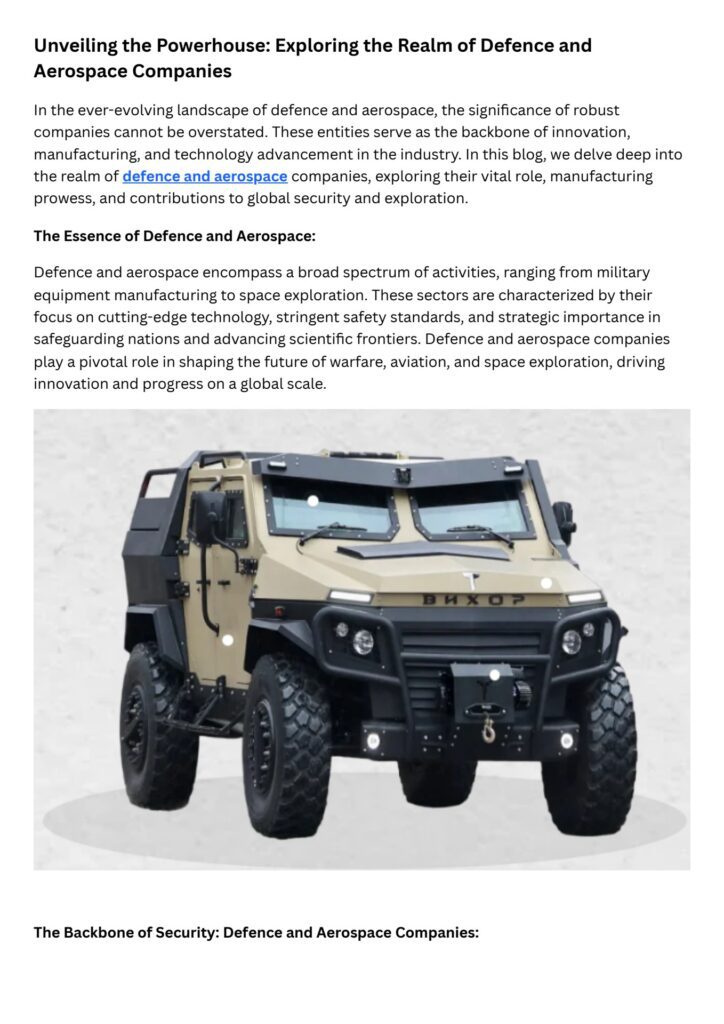Defense innovation is crucial in today’s rapidly evolving technological landscape, with military organizations needing to stay ahead of the curve to face increasingly complex threats. Advancements in artificial intelligence and machine learning, robotics and drones, cybersecurity, and quantum computing are revolutionizing the defense sector. AI technologies analyze data for faster decision-making, drones reduce the need for human personnel in high-risk situations, cybersecurity measures protect sensitive information, and quantum computing allows for complex data analysis. By investing in cutting-edge technologies, defense organizations can enhance their capabilities and adapt to the ever-changing nature of modern warfare, shaping the future of defense for years to come.
Defense Innovation: Exploring the Cutting-Edge of Military Tech
Introduction
In today’s rapidly evolving technological landscape, the need for defense innovation has never been more pressing. As the threats facing nations around the world become increasingly complex and sophisticated, military organizations must constantly strive to stay ahead of the curve by developing cutting-edge technologies that can give them a strategic advantage on the battlefield. In this article, we will explore some of the most exciting advancements in military technology and the implications they have for the future of warfare.
The Rise of AI and Machine Learning
One of the most significant areas of innovation in the defense sector in recent years has been the development of artificial intelligence (AI) and machine learning technologies. These technologies have the potential to revolutionize the way military organizations operate by enabling them to make faster, more informed decisions based on vast amounts of data. AI can be used to analyze satellite imagery, track enemy movements, and even predict future threats with a high degree of accuracy. Machine learning algorithms can also be used to enhance the capabilities of autonomous systems such as drones, allowing them to operate more effectively in complex and dynamic environments.
Advancements in Robotics and Drones
Another key area of innovation in defense technology is the development of advanced robotics and drones. These technologies have the potential to transform the way militaries conduct operations by reducing the need for human personnel in dangerous or high-risk situations. Drones can be used for a wide range of missions, including surveillance, reconnaissance, and targeted strikes. In addition, robotic systems can be deployed to perform tasks such as bomb disposal and search and rescue operations, freeing up human personnel to focus on more strategic objectives.
The Role of Cybersecurity
As military organizations become increasingly reliant on technology to conduct operations, the need for robust cybersecurity measures has become more important than ever. Cyberattacks have the potential to disrupt communications, sabotage critical infrastructure, and even compromise sensitive military information. To counter this threat, defense organizations are investing heavily in developing advanced cybersecurity technologies that can protect their networks and systems from cyber threats. This includes the use of encryption, intrusion detection systems, and advanced threat monitoring tools to identify and neutralize potential threats before they can cause harm.
The Promise of Quantum Computing
One of the most exciting areas of innovation in defense technology is the development of quantum computing. Quantum computers have the potential to revolutionize the way military organizations process and analyze data by performing complex calculations at speeds that are far beyond the capabilities of traditional computers. This could enable defense organizations to simulate complex battlefield scenarios, optimize logistics operations, and develop more sophisticated predictive models for strategic planning. While the technology is still in its early stages, the potential benefits of quantum computing for the defense sector are vast and could have a profound impact on the future of warfare.
Conclusion
As the nature of warfare continues to evolve, defense organizations must constantly strive to stay at the cutting-edge of technology to maintain their strategic advantage. By investing in innovative technologies such as AI, robotics, cybersecurity, and quantum computing, militaries around the world can enhance their capabilities, improve their operational effectiveness, and adapt to the ever-changing nature of modern warfare. As we look to the future, it is clear that the defense sector will continue to be at the forefront of technological innovation, driving advancements that will shape the future of warfare for years to come.
